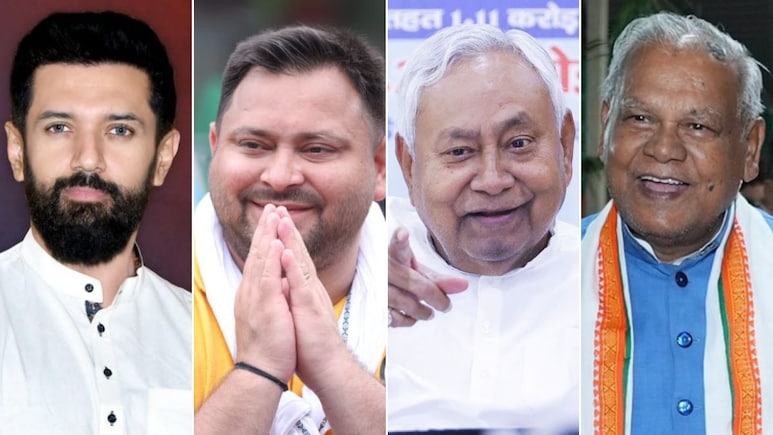
In the hot and humid heartland of Bihar, shaped like a griddle, where the Ganges flows as both lifeblood and metaphor, the stage is set for a political drama that is as much about loyalty as it is about ambition. The November 2025 assembly elections loom like a monsoon cloud, heavy with promise and peril. The National Democratic Alliance (NDA), a coalition stitched together by pragmatism and power, finds itself at a crossroads. Its smaller allies-Chirag Paswan's Lok Janshakti Party (Ram Vilas) and Jitan Ram Manjhi's Hindustani Awam Morcha (Secular)-are no longer content to play supporting roles. They demand a larger share of the spotlight, threatening to upend the delicate balance that has kept the NDA afloat. This is not just politics; it is a human story of trust and betrayal, of roots and aspirations, played out under the relentless sun of Bihar's electoral battlefield.
The Restless Allies
Chirag Paswan, the young scion of the late Ram Vilas Paswan (an iconic Dalit leader), carries the weight of his father's legacy like a mantle of fire. His LJP (Ram Vilas) has emerged as a potent force, particularly among the Dusadh or Paswan caste, a dominant Dalit group in Bihar. The British colonials considered the Dushads (Paswans) as a "criminal caste," but the truth is most of the village security personnel were drawn from the Paswan community. A large section of the Paswans is Kabirpanthis in Bihar, inspired by the poet-saint Kabir Das.
In 2024, Mr Chirag's party swept all five Lok Sabha seats it contested, a feat that has emboldened him to demand a significant share of the 243 assembly seats-some say as many as 40 for the November 2025 assembly elections. His audacious threat to contest all 243 seats independently if his demands are unmet is less a bluff than a reminder of his growing clout. In the dusty lanes of Hajipur, where his father once reigned supreme, Mr Chirag's voice resonates with the fervour of a man who believes destiny is his to claim.
Jitan Ram Manjhi, the weathered former chief minister, brings a different kind of gravitas. His HAM (Secular) represents the Mahadalit community, particularly the Mushahar (considered rat-eaters in the past) caste, and his victory in the Gaya Lok Sabha seat in 2024-after years of electoral heartbreak-has given him newfound leverage. Mr Manjhi's demand for all seats in Gaya and Aurangabad is a bold gambit, rooted in his belief that his community's loyalty deserves a larger slice of the electoral pie. At 79, Mr Manjhi is no novice; he knows the value of his presence in the NDA's caste arithmetic, and he wields it like a seasoned chess player moving a knight into position.
These demands are not mere posturing. They are the tremors of a shifting landscape, where smaller allies, once content to orbit the twin suns of the Bharatiya Janata Party (BJP) and Janata Dal (United), or JD(U), now seek to redefine the constellation. The question is: how much can the BJP and JD(U) bend before they break?
The Vulnerability Of Giants
The BJP and JD(U), the NDA's major partners in Bihar, are like two old friends who need each other but occasionally chafe at the arrangement. The BJP, with its Hindutva appeal and urban strongholds, commands a loyal base among upper castes and non-Yadav OBCs. JD(U), led by the wily Nitish Kumar, holds sway over the Kurmi and Extremely Backwards Classes (EBCs), a coalition of smaller castes that form a critical vote bank. Together, they have dominated Bihar's politics, but their vulnerabilities are as real as the cracks in the parched earth of the Gangetic plains.
In the 2020 assembly elections, the NDA secured 125 of 243 seats, with the BJP winning 74 (19.46 per cent vote share) and JD(U) 43 (15.39 per cent vote share). Chirag Paswan's LJP, then outside the NDA fold, contested against JD(U) in many seats, splitting votes and weakening Nitish Kumar's party. But the LJP, which contested from 135 seats, won only one from Matihani in Begusarai. Critics of Chirag Paswan, including his uncle Pashupati Kumar Paras, pointed out, "Chirag committed political hara-kiri." The LJP split into two, one led by the nephew, the other by the uncle. The situation was like an echo from neighbouring Uttar Pradesh, where Samajwadi Party leader Akhilesh Yadav wrestled his uncle Shivpal Yadav and split the party into two.
The history of the chacha-bhatijah battle of Bihar splitting the LJP lingers like a shadow, a reminder that Chirag Paswan's ambitions can wound. The 2024 Lok Sabha elections, however, showed a reunited NDA in fine form: the BJP and JD(U) won 12 seats each, LJP (Ram Vilas) took 5, and HAM secured 1, collectively claiming 30 of Bihar's 40 seats. Yet, the opposition INDIA bloc's 9 seats and a resurgent Rashtriya Janata Dal (RJD) with a 22.62 per cent vote share signal that the NDA's dominance is not unassailable.
The BJP, despite its organisational might, faces pressure from its reliance on allies to counter anti-incumbency and the RJD's aggressive MY-BAAP (Muslim-Yadav-Bahujan-Agada-Aadhi Abaadi-Poor) strategy. Nitish Kumar, now in his ninth term as chief minister, is both an asset and a liability. His health concerns and recent verbal gaffes have sparked whispers about his longevity, and the BJP's cryptic refusal to unequivocally endorse him as the NDA's chief ministerial face adds to the tension. Posts on X reflect this unease, with some suggesting that Nitish Kumar's absence could cost the NDA dearly, while others note the BJP's growing confidence in its own brand, even as "Brand Modi" shows signs of fading.
Chirag Paswan's demands threaten to destabilise this equilibrium. With his 2020 rebellion, when he contested 135 seats and won one (from Begusarai's Matihani), Chirag Paswan demonstrated his ability to disrupt the JD(U)'s prospects. If he pushes for 40 seats-or worse, goes solo-the BJP may face Hobson's choice: cede ground and risk alienating JD(U), or stand firm and lose Chirag Paswan's Dalit vote bank. Mr Manjhi's insistence on Gaya and Aurangabad, where HAM has a strong local presence, adds another layer of complexity. The BJP and JD(U) may resist, as these regions are also their strongholds, but alienating Mr Manjhi could fracture the NDA's Mahadalit support.
To understand the stakes, consider the data below:
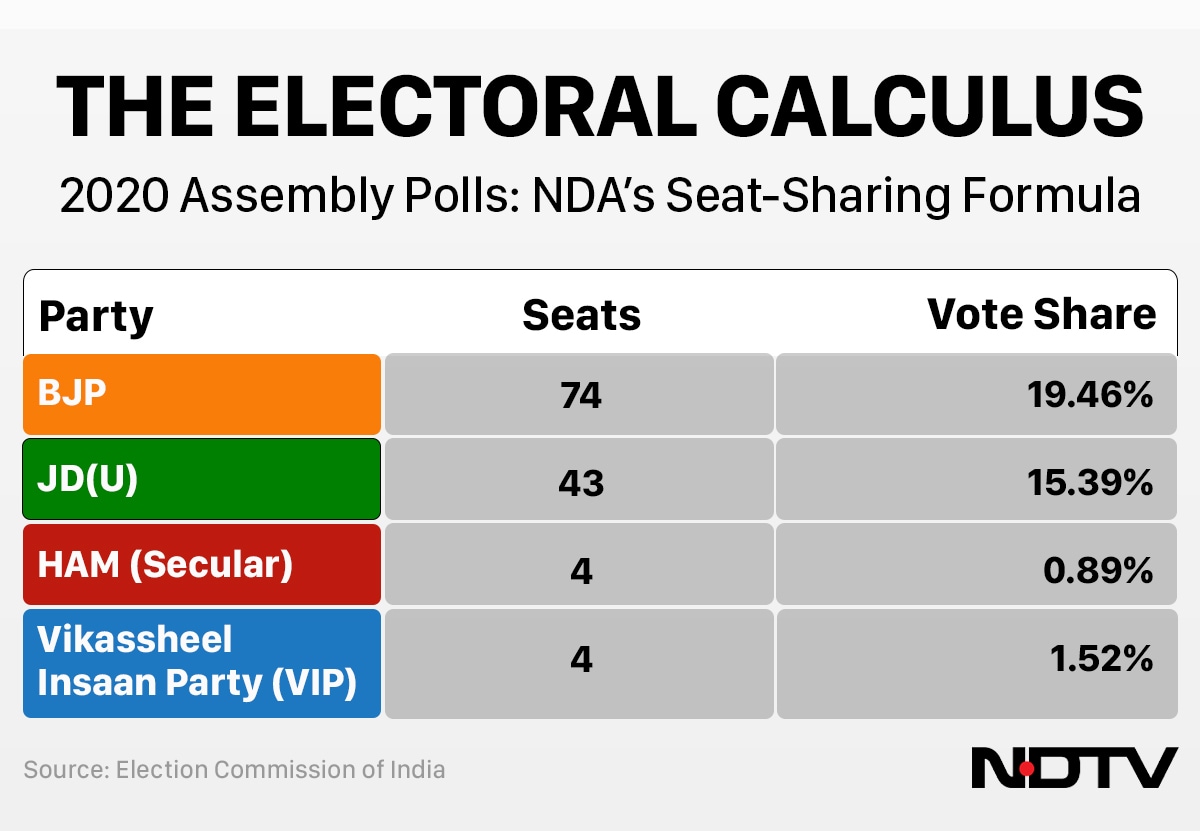
LJP (Ram Vilas), then outside the NDA, won one seat (Matihani from Begusarai) with a 5.66 per cent vote share in Bihar, underscoring its (vote katwa) spoiler potential. Later, the LJP MLA defected to JD(U). In 2024, the Lok Sabha elections painted a different picture:
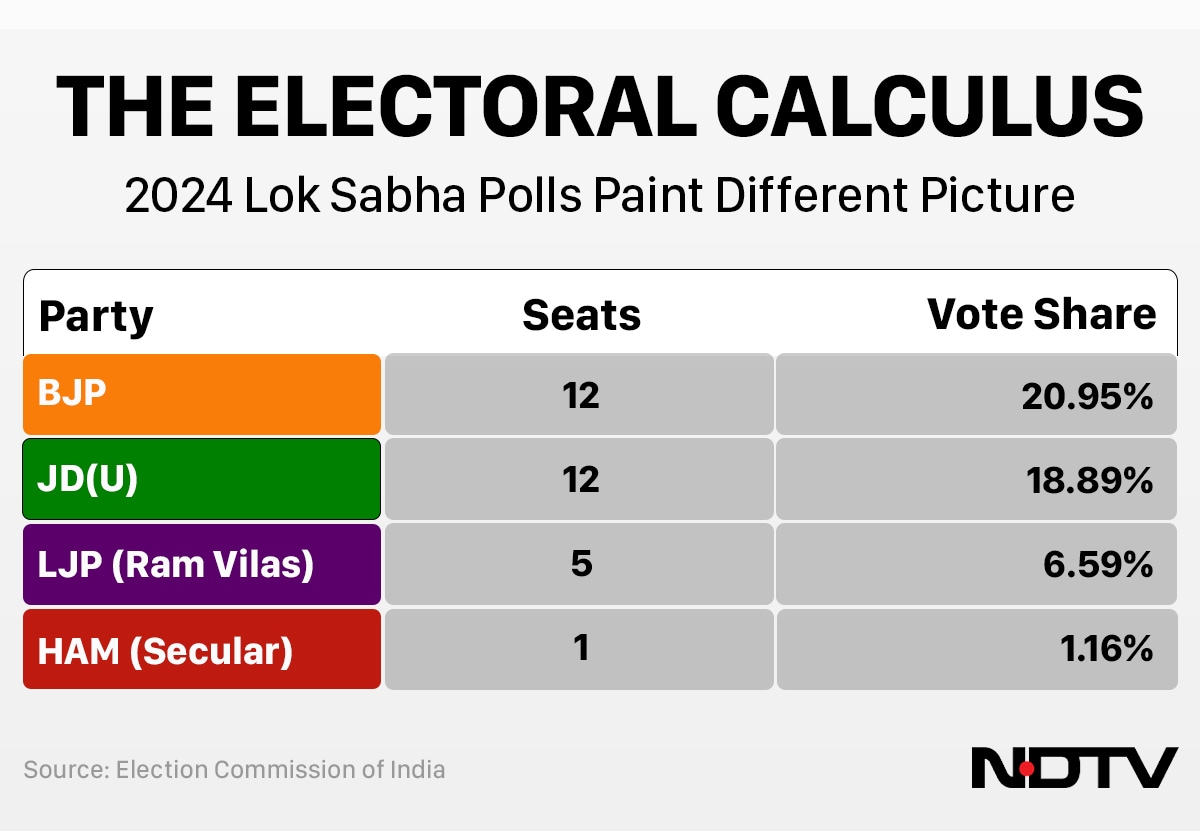
The following charts visualise this data:
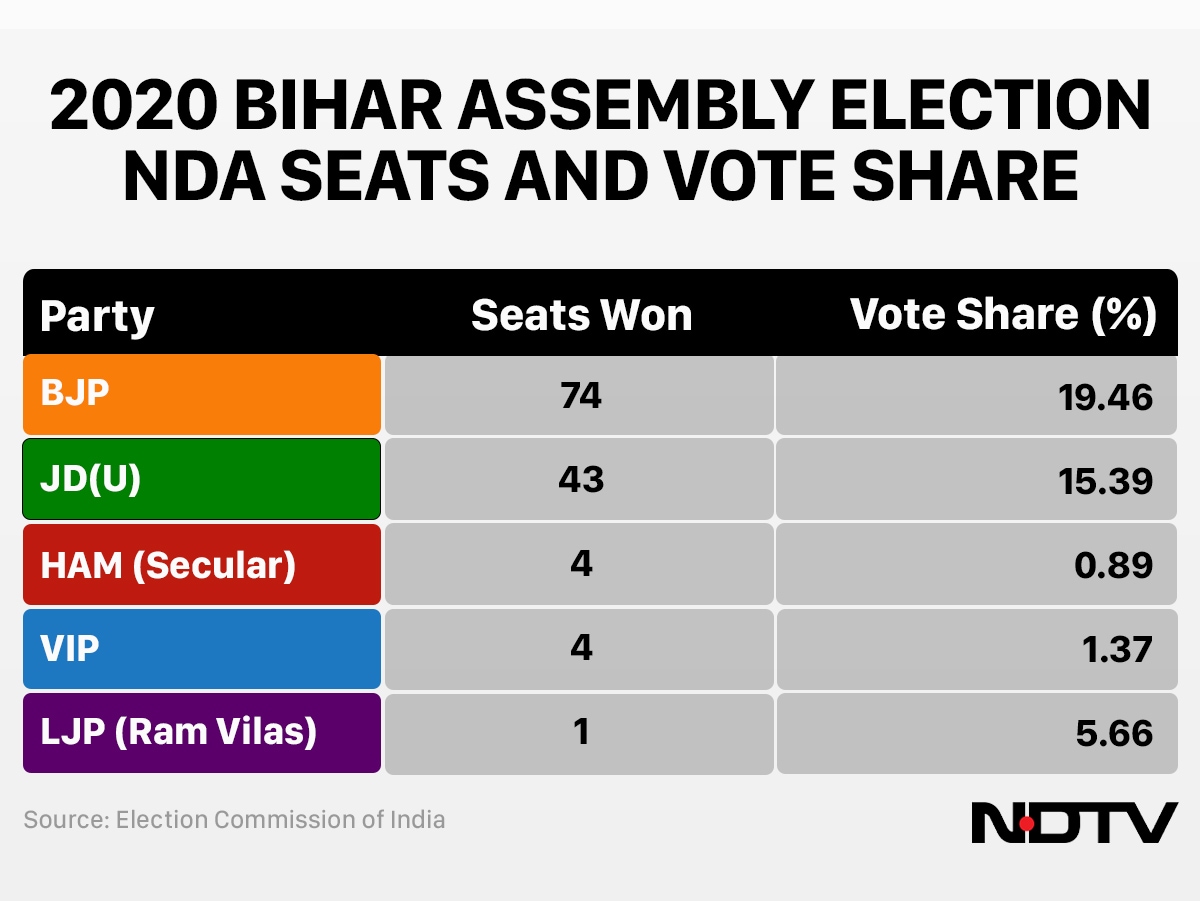
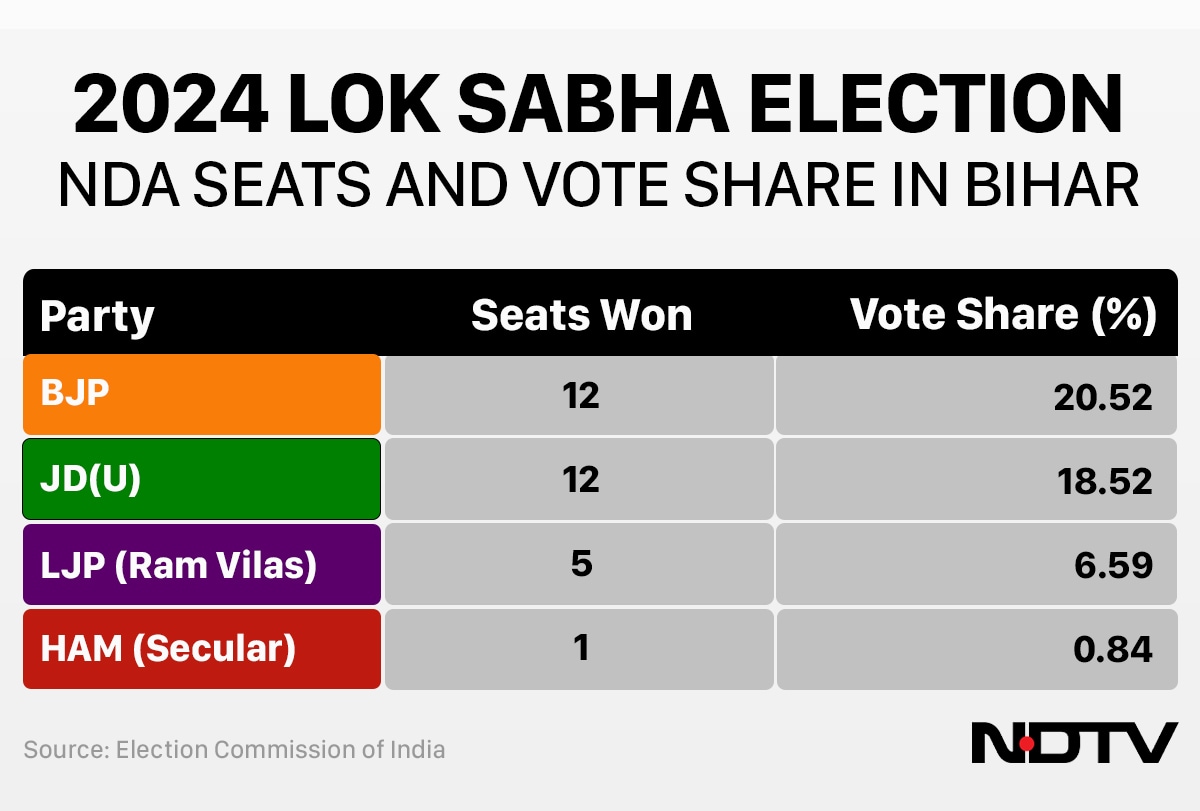
These numbers reveal the NDA's strength but also its fragility. The BJP and JD(U) rely on their allies' caste-based vote banks to cobble together a winning coalition. Chirag Paswan's 6.59 per cent vote share in 2024, concentrated among Paswans, and Manjhi's 1.16 per cent in Gaya, pivotal for Mahadalits, are not just statistics-they are the lifeblood of the NDA's social engineering.
The Fortunes Of The NDA
The NDA's fortunes in November 2025 hinge on its ability to placate its allies without fracturing the coalition. Recent reports suggest a tentative seat-sharing formula: JD(U) capped at 102 seats, BJP at 101, LJP (Ram Vilas) at 20, HAM at 10, and Rashtriya Lok Morcha (RLM) at 10. Yet, Chirag Paswan's push for 40 seats and Mr Manjhi's demand for Gaya and Aurangabad signal that negotiations will be fraught. The BJP, as the alliance's anchor, holds the reins but must tread carefully. Its decision to grant Chirag Paswan five Lok Sabha seats in 2024, including the prized Hajipur, was a masterstroke that secured his loyalty, but the assembly election's larger canvas demands a different calculus.
If the BJP concedes too much to Chirag Paswan and Mr Manjhi, it risks alienating JD(U), whose 100-seat demand reflects Nitish Kumar's determination to remain relevant. If it holds firm, Chirag Paswan's threat to go solo could split the Dalit vote, benefiting the RJD-led Mahagathbandhan, which is already gaining traction among Muslims, Yadavs, and now Kushwahas, thanks to its 2024 Aurangabad victory. The RJD's 23.11 per cent vote share in 2020 and its strategic induction of Pashupati Kumar Paras, Chirag Paswan's estranged uncle, show its intent to chip away at the NDA's Dalit base.
The NDA's strength lies in its umbrella coalition, uniting upper castes (BJP), Kurmis and EBCs (JD(U)), Paswans (LJP), and Mahadalits (HAM). But this diversity is also its Achilles' heel. Chirag's veiled criticism of Nitish Kumar's governance, particularly on law and order, hints at tensions within the alliance. Mr Manjhi's insistence on specific seats could force the BJP to sacrifice winnable constituencies, weakening its own tally. Meanwhile, the opposition's focus on unemployment and voter roll controversies could amplify anti-incumbency, especially among the youth.
A Tapestry Of Ambition
In Bihar, politics is not just a game of numbers; it is a tapestry woven from caste, history, and human longing. Chirag Paswan, with his cinematic flair and youthful energy, dreams of a Bihar where his father's legacy becomes a dynasty. Jitan Ram Manjhi, weathered yet resolute, seeks to carve out a fiefdom for his people in the rocky hills of Gaya. The BJP and JD(U), like seasoned travellers, know that the road to power is paved with compromises, but each step risks a miscalculation.
As the November rains approach, the NDA must navigate this labyrinth with care. Chirag Paswan's threat to contest all 243 seats may be a bargaining chip, but it carries the weight of possibility. Mr Manjhi's demands, though narrower, are no less potent. The BJP, with its organisational might, and JD(U), with Nitish Kumar's enduring appeal, can absorb these pressures if they move with unity. But in Bihar, where alliances shift like the Ganges' course, nothing is certain. The NDA's victory will depend on whether it can turn its allies' ambitions into harmony-or whether the discordant notes of greed and pride will drown out the song of coalition.
Track Latest News Live on NDTV.com and get news updates from India and around the world

